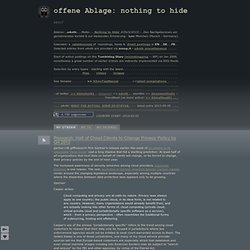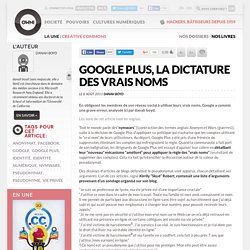

Research: Half of Cloud Clients to Change Privacy Policy by Q4 2012. Research firm Gartner's release earlier this week of an update to its venerated "Hype Cycle" cast a long shadow that hid a startling prediction: At least half of all organizations that host data on behalf of clients will change, or be forced to change, their privacy policies by the end of next year.

The increased awareness of security breaches among cloud providers, especially Amazon, is one reason. The rest, according to Gartner research director Carsten Casper, center around the changing legislative landscape, especially among multiple countries where the disparities between data protection laws appears only to be growing. Sponsor Casper writes: Cloud computing and privacy are at odds by nature. Casper's use of the phrase "jurisdictionally specific" refers to the trend among cloud customers to request that their data only be housed in jurisdictions where law enforcement agencies would not be entitled to seek court-warranted access to them. That fact has U.S.
Discuss. Google Plus, la dictature des vrais noms. En obligeant les membres de son réseau social à utiliser leurs vrais noms, Google a commis une grave erreur, analysée ici par danah boyd.

Les liens de cet article sont en anglais. Tout le monde parle des“nymwars” [(contraction des termes anglais Anonym et Wars (guerres)], suite à la décision de Google Plus d’appliquer sa politique qui n’autorise que les comptes utilisant le “vrai nom” de leurs utilisateurs. Au départ, Google Plus a été pris d’une frénésie de suppression, éliminant les comptes qui enfreignaient la règle. Quand la communauté a fait part de son indignation, les dirigeants de Google Plus ont essayé d’apaiser leur colère en détaillant leur “nouveau” mécanisme “amélioré” pour appliquer la règle des “vrais noms” (en évitant de supprimer des comptes). Cela n’a fait qu’intensifier la discussion autour de la valeur du pseudonymat. Datenschutz und Datensicherheit. Vom anonymen Surfen bis zur verschlüsselten Festplatte «Es ist bedenklich, dass kaum jemand weiß, welche Daten über ihn gespeichert sind.

Es ist äußerst bedenklich, dass kaum jemand weiß, wer diese Daten gerade besitzt. Bedenklich ist es hingegen nicht, dass sich nur eine Minderheit dagegen wehrt. Das ist dramatisch.»Hamann/Rohwetter Die eigenen Daten zu schützen heißt, die Daten und Dokumente, die am eigenen Rechner gespeichert werden, unbefugten Zugriffen zu entziehen. Von gläsernen Surfern und “Datenkraken” Ein Ergebnis unserer Internet-Ausflüge ist viel zu oft ein prall gefüllter Akt an gesammelten Daten. DIE ABWEHR DER DATENSAMMELWUT ➊ Ein Video aus der Reihe Quarks & Co des WDR gibt «Fünf goldene Regeln zur Datensicherheit». Im beruflichen Alltag gibt es eine ganze Reihe von Punkten, die es zu beachten gilt, sollen Daten vor unabsichtlicher Weitergabe an Dritte geschützt werden. Die Frage «Warum Datenschutz im Internet?» Informationell selbstbestimmt im Netz. Datenschutz und Datensicherheit. Vom anonymen Surfen bis zur verschlüsselten Festplatte «Es ist bedenklich, dass kaum jemand weiß, welche Daten über ihn gespeichert sind.
Es ist äußerst bedenklich, dass kaum jemand weiß, wer diese Daten gerade besitzt. Bedenklich ist es hingegen nicht, dass sich nur eine Minderheit dagegen wehrt. W3C Tracking Protection Working Group - 2011-09. C Tracking Protection Working Group. The Tracking Protection Working Group is chartered to improve user privacy and user control by defining mechanisms for expressing user preferences around Web tracking and for blocking or allowing Web tracking elements.
The group seeks to standardize the technology and meaning of Do Not Track, and of Tracking Selection Lists. Carl Cargill (Adobe), Justin Brookman (CDT) and Matthias Schunter (Intel) serve as co-chairs of the Tracking Protection Working Group. The W3C Team Contacts are Nick Doty and Ninja Marnau. Meetings Subscribe to the public meetings calendar: iCalendar | HTML Next teleconference 16 April 2014, 9am PT, 12pm ET, 6pm CET Teleconferences are held Wednesdays at 9am/12pm/6pm +1.617.761.6200, conference code TRACK (87225) irc.w3.org, channel #dnt Resources Timeline Past meetings Initial Face-to-Face 21-22 September 2011Cambridge, MA, USA Agenda Logistics for live and remote attendees Draft minutes: 9/21 | 9/22 Past teleconferences Most recent minutes first; ordered left to right.